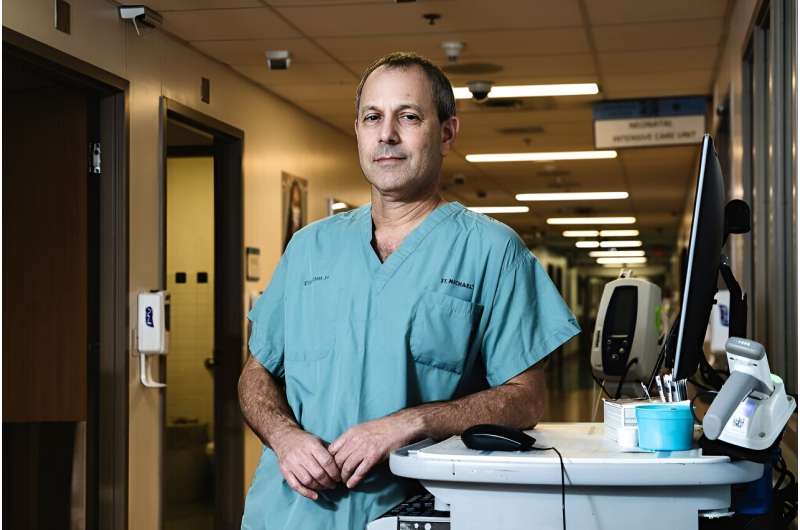This article has been reviewed according to Science X's editorial process and policies. Editors have highlighted the following attributes while ensuring the content's credibility:
fact-checked
trusted source
proofread
OB-GYN answers questions about advanced maternal age, fertility and pregnancy

The average maternal age in Canada increased over the last few decades, according to data from Statistics Canada. In 2021, 25% of all mothers at childbirth were 35 years of age and older, an increase from 16% in 2001.
Research shows that women who are 35 years and older face an increased risk of maternal and fetal health complications.
Dr. Howard Berger leads the Division of Maternal Fetal Medicine and Obstetric Ultrasound at St. Michael's Hospital. We spoke with him about advanced maternal age, fertility, health risks and complications and what care options are available at St. Michael's.
What is known about advanced maternal age and fertility?
In general, we know that as women age, their fertility decreases. This is a gradual decline—not a sudden drop off—starting in your 30s. As a result, women may find it more difficult to become pregnant as they age. This is especially true of women 40 and older.
A large part of this decline is due to the changes in women's eggs over time that lead to decreased chances of spontaneous conception. Eggs from older women also have a higher frequency of resulting in embryos that have chromosomal abnormalities. This is directly linked to a higher rate of miscarriage. Older eggs are also associated with embryos that have a higher rate of a non-lethal chromosomal abnormalities, such as Down Syndrome.
Egg quality is something that all women considering pregnancy should take into consideration.
What are the health risks or complications associated with advanced maternal age?
Large population-based studies tell us that once a women of advanced maternal age does become pregnant and passes the 13 week gestation mark, she faces an increased risk for several health complications, including gestational diabetes, pre-eclampsia (a condition that can include high blood pressure and organ damage) and pre-term birth—which is delivering their baby before 37 weeks gestation.
Interestingly, if you look at studies, the increase in pre-term birth is actually u-shaped—both very young moms and older moms have higher rates of pre-term birth. But the reasons are different.
For very young mothers, the factors driving pre-term birth are likely related to socio-economic status or infectious illness. For mothers of advanced maternal age, pre-term birth is usually a result of the mother developing complications such as pre-eclampsia or gestational diabetes, and clinicians making the decision that it's safer to deliver the baby earlier. Fewer pre-term births among older moms are the result of spontaneous labour.
It's also important to recognize that women of advanced maternal age face different risks based on their baseline health. There is a difference between a 35-year-old woman who is generally healthy and has no pre-existing chronic conditions, and a 35-year-old woman who has Type 2 diabetes, hypertension and a BMI over 29. These two women face different risks, despite being the same age.
Is there anything women over the age of 35 can personally do to reduce their risks?
The best outcomes for pregnancy occur when you optimize mom's health before pregnancy. I always say optimizing mom's health before pregnancy can help reduce these risks—it can't entirely eliminate them, but it can lower them. This means speaking and working with your family physician before trying to become pregnant. This could mean lowering your blood sugars or controlling hypertension or losing weight– even if you use medication, that's OK and can help reduce risk.
What kinds of services does St. Michael's Hospital offer to women of advanced maternal age that are considering pregnancy?
St. Michael's has a high-risk pregnancy clinic that receives referrals from all across the city and the province. The program provides pre-pregnancy counseling to women for a range of indications, including previous medical disorders, previous adverse pregnancy experiences or obstetric outcomes. But we see a large number of women in this program, whose sole indication is advanced maternal age. This program operated mostly virtually during the pandemic, and we believe this is an excellent use of virtual care.
Besides having an excellent OB team, the St. Michael's Obstetrics Department has the ability to deliver complex interdisciplinary care. We can provide a patient-centered low-risk birthing environment, but also have all the subspecialty consults and interventions that could be needed if the situation demands a higher level of care. As a quaternary center for maternal care and trauma, St. Michael's Hospital can offer 24/7 emergency life-saving services.




















